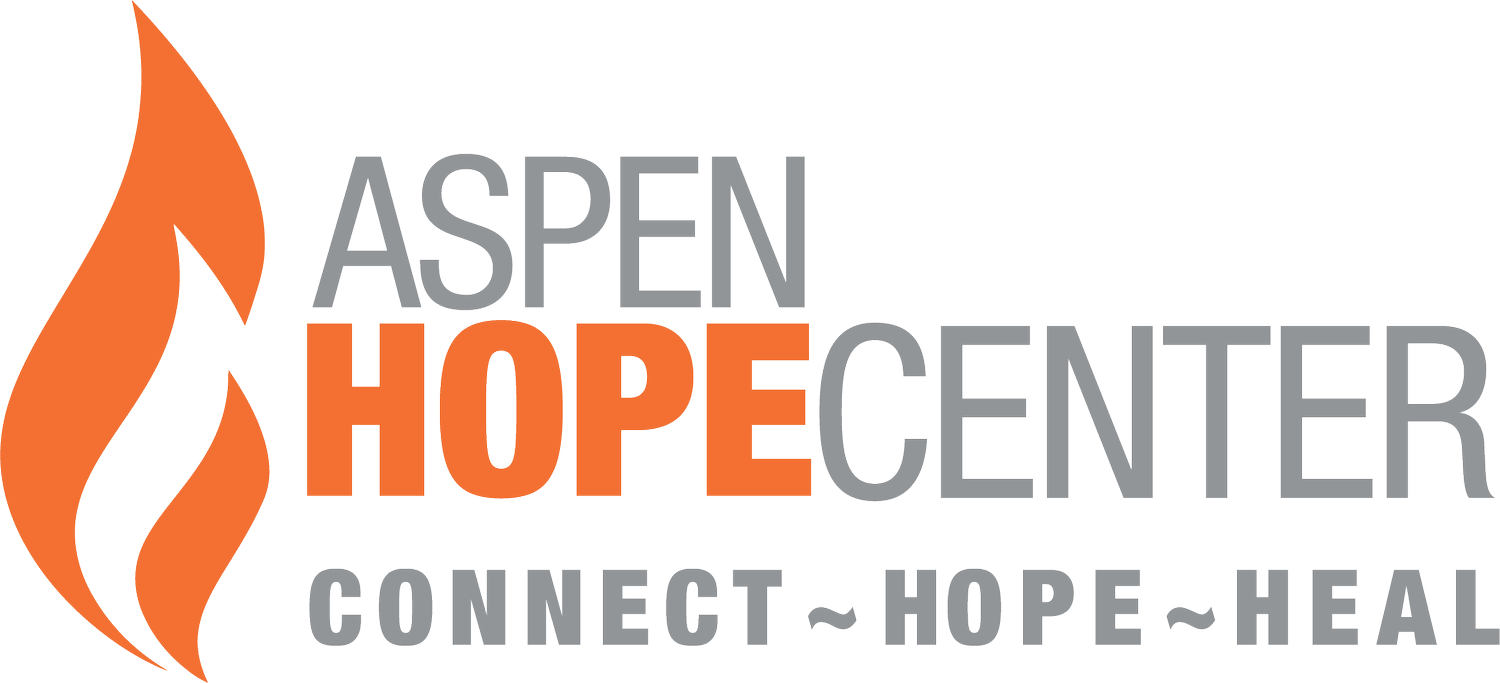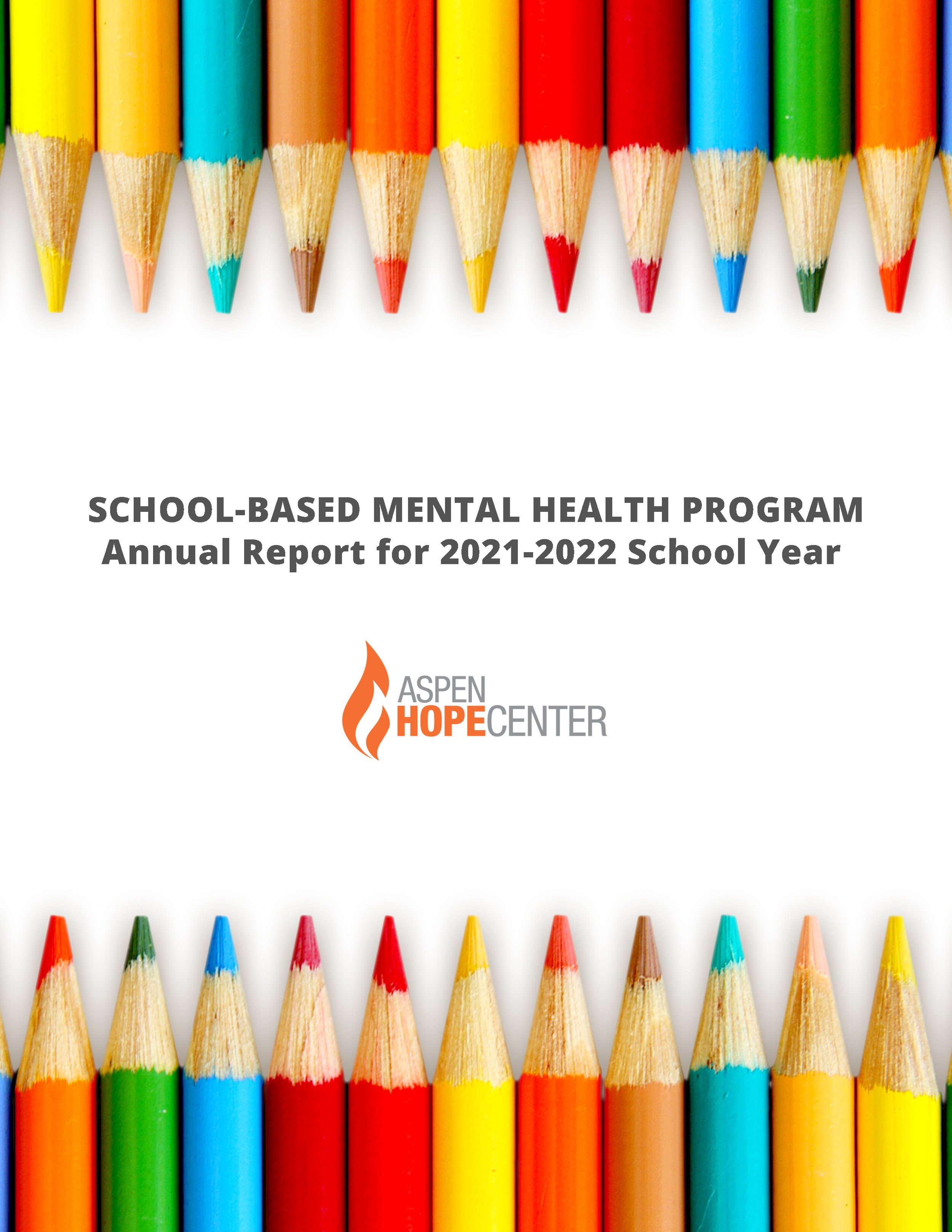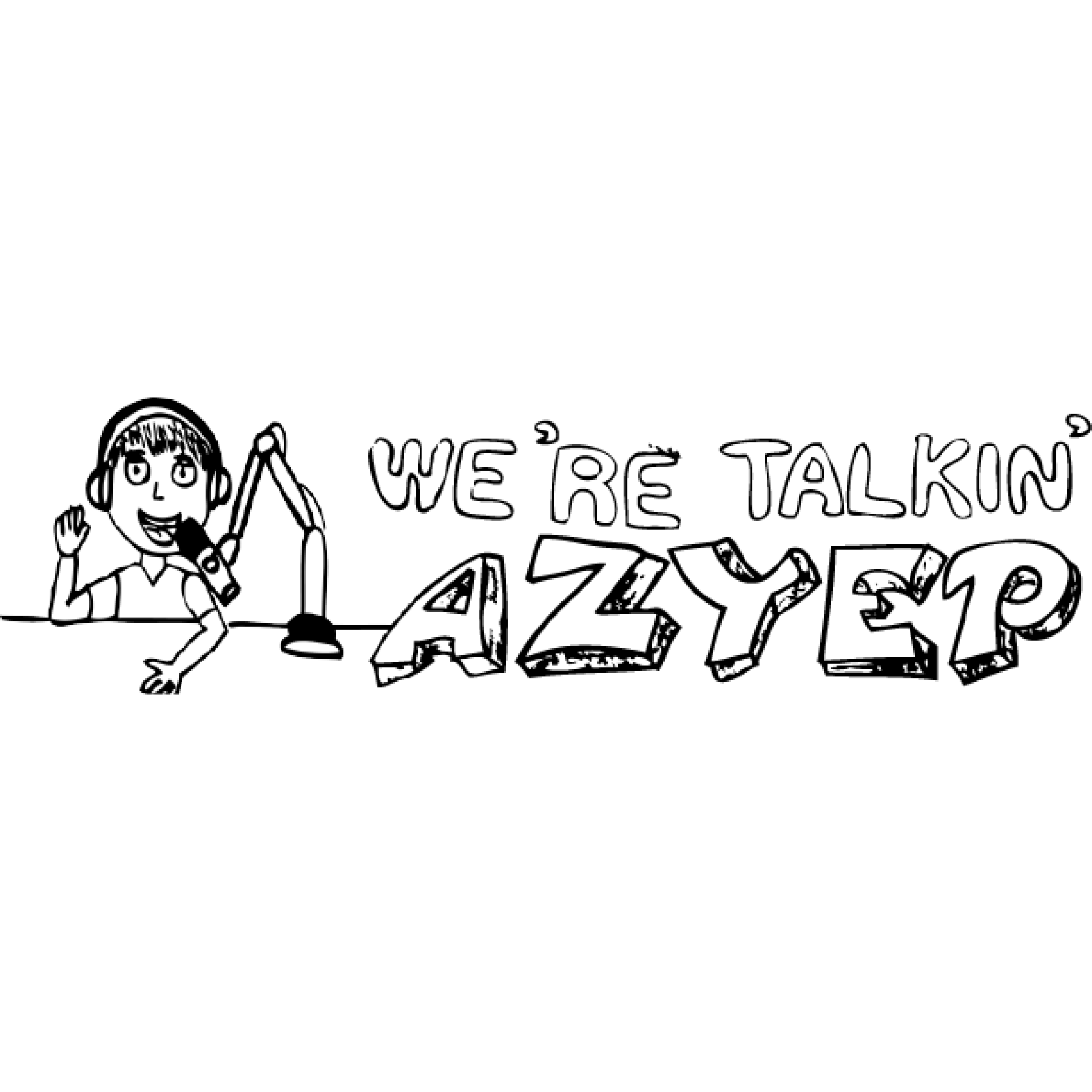
You Are Not Alone.
Aspen Hope Center provides an array of mental health services such as crisis intervention, suicide awareness, mobile crisis response, therapy, a confidential 24/7 HopeLine, a robust school-based program and referrals to appropriate providers. Across all programs, the Hope Center strives to reduce the stress of navigating the system of mental health and remove barriers to care.
Our Mission:
Aspen Hope Center’s mission is to deliver compassionate, high-quality mental health care and crisis support along a continuum, focused on serving individuals from Aspen to Parachute.
Our Vision:
We imagine a future where no one confronts mental health alone.
In 2022, Aspen Hope Center received accreditation from the American Association of Suicidology. Aside from 988 Colorado which operates the state crisis line, Aspen Hope Center is the only crisis agency that holds this honor and employs mobile crisis and co-response clinicians.
Hope Center Programs
The Hope Center provides a specific array of services that were designed to decrease the stress of navigating the convoluted system of mental health and most importantly, to tighten the reins on the gaps found in the services provided in the Roaring Fork Valley.
Our Programs
-

<div class='icon-title'><i class="fas fa-phone-alt"></i>24-Hour HopeLine</div>
The Aspen Hope Center provides a 24-hour confidential line to ensure that anyone who calls for help reaches an on-call clinician day or night, seven days per week.
-

<div class='icon-title'><i class="fas fa-info"></i>Information & Referral</div>
When a client calls for a referral, the Hope Center clinician makes it a priority to connect them with the appropriate practitioner or agency from Aspen to Parachute.
-

<div class='icon-title'><i class="fas fa-comments"></i> Therapy</div>
The Hope Center offers short-term, solution-focused therapy provided by licensed therapists for various types of life struggles.
-

<div class='icon-title'> <i class="fas fa-heartbeat"></i> Intensive Stabilization Program</div>
The Aspen Hope Center created the Intensive Stabilization Program as an alternative to inpatient psychiatric hospitalization. This program helps people emerge and heal from a crisis with the support of the crisis team, local professionals, and daily therapy; all without leaving the valley and spending days in a locked facility.
-

<div class='icon-title'> <i class="fas fa-walking"></i> Mobile Crisis / Co-response Program </div>
Each person who calls in crisis requires an individualized approach to handle their particular situation.
-

<div class='icon-title'> <i class="fas fa-book-open"></i>School-based Mental Heath Program</div>
The Hope Center and RE-1 school district partner to provide all crisis services and prevention education programs to the schools in the district.
-

<div class='icon-title'> <i class="fas fa-users"></i>Community Education</div>
The Aspen Hope Center believes that to raise awareness and reduce the stigma of mental illness, education is key.
-

<div class='icon-title'> <i class="fas fa-chalkboard-teacher"></i> Consulting Services </div>
The deep collaborations and partnerships the Hope Center have with local agencies, businesses and other non-profits is what adds to the care and healing that is able to be provided.

Help fund crucial, life-changing elements of mental health care needed in our community.
Our History
Given the history of a high suicide rate in the Roaring Fork Valley, Aspen Valley Medical Foundation partnered with the University of Colorado Denver Depression Center and the nine-month research study produced what is today known as Aspen Hope Center
Four main pillars became the foundation of service provision:
24-hour HopeLine
mobile crisis team
stabilization program
robust education and outreach program
Aspen Hope Center opened with just six employees
Formed partnership with Basalt High School and the school-based health center, launching the school-based mental health program with one clinician
Aspen Valley Medical Foundation closed, Aspen Hope Center became independent 501(c)3, continually supported by the community
Held the agency’s first Community Forum at the Wheeler Opera House with more than 300 people in attendance
Expanded school-based services to include a second clinician at Roaring Fork High School
Grew school-based program to hold four clinicians
Opened first satellite office in Eagle, Colorado
Received a major state contract for mobile crisis in the Roaring Fork Valley
Expanded the school program from four clinicians to 12 in one year
Grew the crisis program from five to nine clinicians Spun the Hope Center of the Eagle River Valley to its own 501c3, now known as Your Hope Center
Created the consulting and training pillar of programming to aid other communities in standing up mobile crisis teams in Colorado
During the pandemic, entered a capital campaign overnight and in four months, raised 100% of the amount to purchase the Midland Avenue office on the Riverwalk in Basalt
Successfully helped Gunnison Valley stand up a mobile crisis team and obtain state contract independent of a community-based health center
Hired the agency’s first program director
Further increased school-based mental health services to include 14 clinicians in our valley’s schools
Hired the agency’s first operations director in an effort to continue expanding the backend infrastructure to support the frontline services
Held first-ever Light Up the Night gala which netted just over $1 million
Received accreditation from the American Association of Suicidology - aside from Colorado Crisis Services which operates the state crisis line, Aspen Hope Center is the only crisis agency that holds this honor and employs mobile crisis and co-response clinicians.
Administrative team and supervisors participated in JEDI (justice, equality, diversity, inclusion) training
Hired development director
Held second annual gala
Secured contract to provide crisis services in Pitkin County
Expanded school-based services into Aspen School District, increasing program to include 18 clinicians
Hosted ‘Connect, Hope, Heal” symposium
Hired clinical director
Hired human resources manager
Annual Reports
Testimonials & Stories
“Before my back injury, my life was rewarding. I was an avid runner, hiker, and fly fisherman. I volunteered with Mountain Rescue-Aspen and on an ambulance with the Mexican Red Cross.
After the injury, I lost everything I loved to do. Despite three back surgeries, I was in horrendous pain constantly and on high doses of pain medications. I went to bed every night with excruciating pain. I lost hope and did not see any light at the end of the tunnel. For several weeks as I lay in bed at night, I composed and refined a suicide note in my head and made plans for how to kill myself.
Finally, one morning, I begged my wife to let me die. She knew I was in crisis and immediately called The Hope Center. The counselors helped me out of the darkness. They pulled me back from the brink. I owe them my life. Now, despite three more back surgeries and daily pain, I am alive to enjoy my life and family thanks to you.
I know there are many people out there who are in crisis or are headed into crisis. They may not have someone to grab them and pull them back from the brink. They may feel alone and have no hope. However, they do not have to be alone, and there is hope.
Because of you, the Hope Center is here to help so many people in our community who need it. I am just so grateful to you that the Hope Center was there when I was at my lowest point.
Thank you again for saving my life.”
“When I was in second grade, my brother and I used to walk home for lunch. We lived on Long Island and my dad worked in Manhattan. This one day, while we were eating our sandwiches, my dad and my Uncle Pat pulled up in the car and walked up the front lawn. My mother said, “What’s going on, why are you here?” Dad said something and I remember my mother screaming. My mother’s brother had died by suicide that morning.
The details were so horrible. He died with his kids, my cousins at home. But no one could talk about it. The impact it had on my mother, and me, and all my cousins and everyone else was so difficult. You didn’t talk about suicide back then. They actually told my grandmother that he had a heart attack.
Till the day my mother died, she was so disappointed that her brother didn’t talk to someone about his problems and get help. She felt helpless that he had no one to talk to, including his siblings. No matter what his problems might have been, she would have done anything in her power to help him. But no one talked about suicide. No one knew.
His suicide has impacted me for fifty years. Helping people talk about suicide is my way of paying tribute to my mom and my cousins. My mom was really proud of our work with the Hope Center, both personally, and as a law enforcement officer.
Hope Center provides support to law enforcement and people in crisis on 911 mental health calls.
As a former Aspen police officer and Pitkin County Sheriff’s deputy, I witnessed the help the Hope Center brings to law enforcement and the public for years. From fatal crashes and drownings to times when people were feeling suicidal, we called the Hope Center. Because of you, the Hope Center, clinicians were there in minutes to listen, assess, and bring hope to the situation.
When a young man was suicidal and intoxicated at the Aspen Airport, he said enough to let us know he had a clear plan to kill himself. We couldn’t just let him go. He needed help. We didn’t want to take him into protective custody with handcuffs. He hadn’t done anything wrong and he didn’t belong in a jail. He needed emotional help. The Hope Center crisis clinician was there immediately.
The young man got the therapeutic help he needed from The Hope Center because people like you provide support. Thank you for caring.
Thank you for talking about suicide. You are making a difference.”
Has the Aspen Hope Center impacted your life in a positive way?
We would love to hear from you.




























